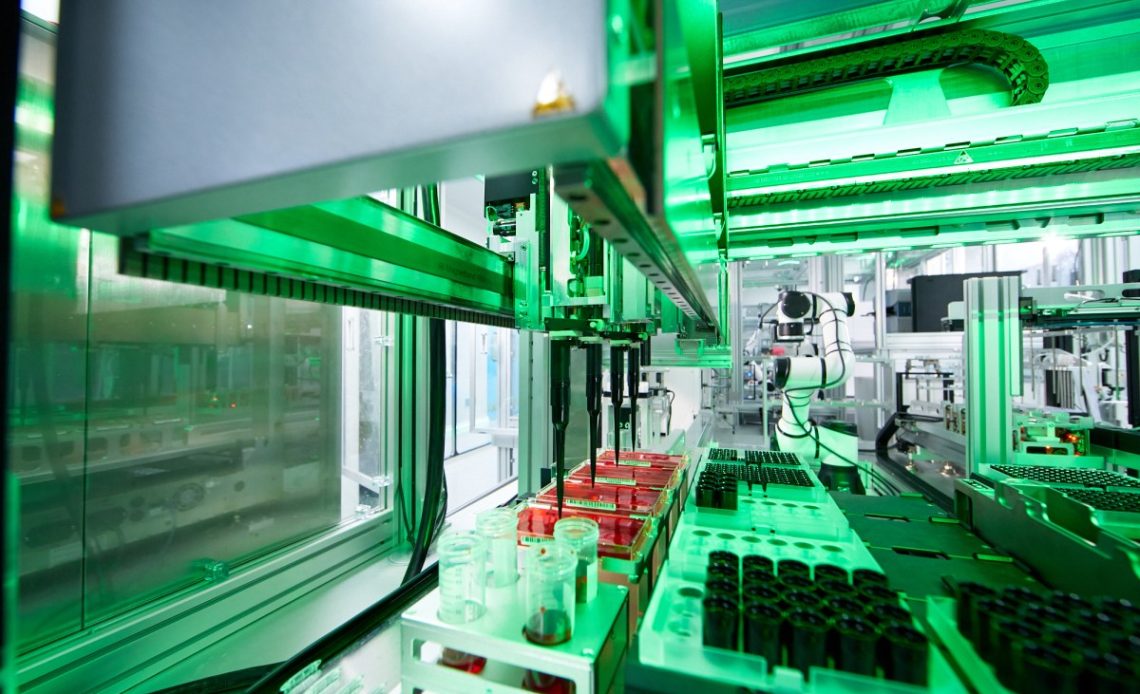
Insilico Medicine, the Hong Kong and New York-based biotech startup that has raised over $400 million to connect biology, chemistry, and clinical trial analysis using next-generation AI systems, announced a new paper today that highlights the journey of what it claims is the first AI-generated and AI-discovered drug — which has now reached Phase II clinical trials.
The paper, in Nature Biotechnology, presents the entire journey of INS018_055, a drug candidate that was discovered using Insilico’s AI platform to treat idiopathic pulmonary fibrosis, a relatively rare but aggressive lung disease. The paper discloses the raw experimental data and the preclinical and clinical evaluation of the potentially first-in-class TNIK inhibitor discovered and designed through generative AI.
According to Insilico founder and CEO Alex Zhavoronkov, the drug is the first where the target was discovered and prioritized using biology AI, while the molecule was generated using generative chemistry AI. The company used its platform, Pharma.AI, which includes multiple AI models trained on millions of data samples for a range of tasks. One of its tools PandaOmics, rapidly identifies and prioritizes targets that play a significant role in a disease’s effectiveness. Another, the Chemistry42 engine, using deep laerning, can quickly design new potential drug compounds that target the protein identified using PandaOmics.
“When our first paper in generative AI for generation of novel molecules was published in 2016, followed by the many follow up papers, the drug discovery community was very skeptical,” he said in a press release. “From my perspective, the progress of INS018_055 serves as a proof-of-concept for Pharma.AI, our end-to-end AI-driven drug discovery platform, but sets a precedent for the potential of generative AI to accelerate drug discovery.”
Drug development, he told VentureBeat in a video interview, is typically a “very long road but also a very risky road” that takes decades of preclinical cell, tissue, animal models and human clinical trials; billions of dollars; and has a more than 90% failure rate. With traditional methods of drug discovery, Insilico has estimated it would have taken more than $400 million and taken up to six years. But with generative AI, the company reached the first phase of clinical trials in only two and a half years, at a fraction of the cost.
Kai-Fu Lee, chairman and CEO of Sinovation Ventures, one of Insilico’s investors, said in a press release that Insilico’s program presents a “breakthrough to efficiently discovering medicines from scratch by processing massive amounts of data through generative AI in chemistry and biology.”
Zhavoronkov said that while he typically does not celebrate, this groundbreaking achievement in AI-driven drug discovery — the culmination of a decade of work, since Insilico’s founding in 2014 — is an exception: “I’ll go and watch Dune,” he said, “with a big bag of popcorn.”
Join leaders in Boston on March 27 for an exclusive night of networking, insights, and conversation. Request an invite here.
Insilico Medicine, the Hong Kong and New York-based biotech startup that has raised over $400 million to connect biology, chemistry, and clinical trial analysis using next-generation AI systems, announced a new paper today that highlights the journey of what it claims is the first AI-generated and AI-discovered drug — which has now reached Phase II clinical trials.
The paper, in Nature Biotechnology, presents the entire journey of INS018_055, a drug candidate that was discovered using Insilico’s AI platform to treat idiopathic pulmonary fibrosis, a relatively rare but aggressive lung disease. The paper discloses the raw experimental data and the preclinical and clinical evaluation of the potentially first-in-class TNIK inhibitor discovered and designed through generative AI.
The drug’s progress sets precedent for generative AI in drug discovery
According to Insilico founder and CEO Alex Zhavoronkov, the drug is the first where the target was discovered and prioritized using biology AI, while the molecule was generated using generative chemistry AI. The company used its platform, Pharma.AI, which includes multiple AI models trained on millions of data samples for a range of tasks. One of its tools PandaOmics, rapidly identifies and prioritizes targets that play a significant role in a disease’s effectiveness. Another, the Chemistry42 engine, using deep laerning, can quickly design new potential drug compounds that target the protein identified using PandaOmics.
“When our first paper in generative AI for generation of novel molecules was published in 2016, followed by the many follow up papers, the drug discovery community was very skeptical,” he said in a press release. “From my perspective, the progress of INS018_055 serves as a proof-of-concept for Pharma.AI, our end-to-end AI-driven drug discovery platform, but sets a precedent for the potential of generative AI to accelerate drug discovery.”
Insilico reached the first phase of clinical trials in one-third the time
Drug development, he told VentureBeat in a video interview, is typically a “very long road but also a very risky road” that takes decades of preclinical cell, tissue, animal models and human clinical trials; billions of dollars; and has a more than 90% failure rate. With traditional methods of drug discovery, Insilico has estimated it would have taken more than $400 million and taken up to six years. But with generative AI, the company reached the first phase of clinical trials in only two and a half years, at a fraction of the cost.
Kai-Fu Lee, chairman and CEO of Sinovation Ventures, one of Insilico’s investors, said in a press release that Insilico’s program presents a “breakthrough to efficiently discovering medicines from scratch by processing massive amounts of data through generative AI in chemistry and biology.”
Zhavoronkov said that while he typically does not celebrate, this groundbreaking achievement in AI-driven drug discovery — the culmination of a decade of work, since Insilico’s founding in 2014 — is an exception: “I’ll go and watch Dune,” he said, “with a big bag of popcorn.”
VentureBeat’s mission is to be a digital town square for technical decision-makers to gain knowledge about transformative enterprise technology and transact. Discover our Briefings.
Author: Sharon Goldman
Source: Venturebeat
Reviewed By: Editorial Team



